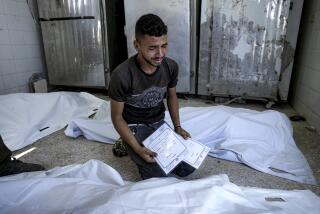MIDEAST : Kuwait Story of Babies Removed From Incubators Refuses to Die
- Share via
KUWAIT CITY — The accusation was shocking, somehow more than an atrocity: “While I was there, I saw the Iraqi soldiers coming into the hospital with guns and go into the room where 15 babies were in incubators. They took the babies out of the incubators, took the incubators and left the babies on the cold floor to die.”
Stupefying--but true?
Amid all the uncontested, horrifyingly brutal actions of the Iraqi occupation army in Kuwait, the notorious baby-incubator story stands out. Did it happen as purported eyewitnesses insist? Or was it an exaggeration, a product of hysteria, propaganda?
Here in Kuwait, in a society painfully sensitive to still-fresh images of Iraqi abuse, the question is not asked. Almost all Kuwaitis appear to believe the accusation. With all else the Iraqis did here--the torture chambers, peremptory executions, rapes and systematic looting--the incubator story does not stretch belief.
In a press conference last week, Sheik Salim al Salim al Sabah, the foreign minister, mentioned it in a litany of bitter occupation milestones. It has been official Kuwaiti writ since the reports first surfaced a month after the August, 1990, invasion, reinforced by the testimony of a tearful 15-year-old girl before a U.S. congressional hearing two months later, the girl who said the soldiers “left the babies on the cold floor to die.”
But the official version is under challenge. A number of human rights organizations say their investigations do not support it. Amnesty International, for instance, said its inquiries in April, 1991, shortly after the Gulf War ended, “found no reliable evidence that Iraqi forces had caused the deaths of babies by removing them or ordering their removal from incubators.”
Stronger still was the report issued last month by the New York-based Middle East Watch, which said it concluded nearly a year ago that the story was false. Now the controversy has been revived, the rights organization said, and it accused the Kuwaiti government of “apparently deliberate propagation . . . of false accounts of atrocities” that has “diverted the attention from the real violations of human rights committed by Iraqi forces in Kuwait.”
The baby-incubator story is back in the news because of the January disclosure in the American press that the teen-age Kuwaiti girl who testified before the Congress members, and was identified at the time only as Nayirah, is the daughter of Sheik Saud al Nasser al Sabah, Kuwait’s ambassador to the United States. She claimed to have observed the disputed incident at Al Addan Hospital outside Kuwait City, where she was a volunteer.
That disclosure put the spotlight back on the occupation efforts of the exiled Kuwaiti government to wage propaganda war against Iraqi leader Saddam Hussein. In Washington, the campaign was pressed by Citizens for a Free Kuwait, a lobbying outfit that hired the expertise of Hill & Knowlton, the big U.S. firm known for handling public relations for foreign governments.
Now, with the girl’s identity disclosed, another American firm, Kroll Associates Inc., private investigators, has been retained to verify her testimony.
Meanwhile, the State Department has taken the unusual step of publicly supporting baby-incubator accounts put forward by the ambassador’s daughter and other Kuwaitis.
“An incredible twist to press stories looking at Kuwait one year after the invasion is the rather smug and cynical casting of doubt on accounts of atrocities,” Edward W. Gnehm Jr., the U.S. envoy to Kuwait, said in a cable to the State Department in early February. “Officers who have served at this post since the liberation of Kuwait are convinced that premature and newborn babies died when Iraqis removed life support systems from Kuwaiti hospitals.”
Whatever the truth of the baby-incubator story, the brutal Iraqi occupation of Kuwait will not be forgotten here.
More to Read
Sign up for Essential California
The most important California stories and recommendations in your inbox every morning.
You may occasionally receive promotional content from the Los Angeles Times.













